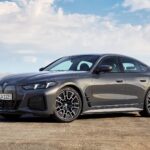For over half a century, the Ford Mustang has captured the hearts of car enthusiasts, maintaining its reign as the most sought-after coupe in its class, with global demand steadily increasing. However, the automotive landscape is shifting, and the question on everyone’s mind is: Are drivers ready to embrace an all-Electric Mustang Suv?
Since the initial announcement at the 2018 North American International Auto Show in Detroit, Ford has maintained a relatively quiet stance regarding its battery-powered marvel. Recently, the automaker offered a tantalizing glimpse into the future with a brief video showcasing a camouflaged prototype undergoing rigorous testing at the Smithers Winter Test Center, approximately 400 miles north of Detroit. This sneak peek, along with other short clips, forms part of Ford’s strategy to tackle what they identify as “EV misconceptions,” anxieties that could deter potential buyers when the electric SUV debuts in the coming year. These concerns primarily revolve around battery-car performance in cold climates, driving range, the accessibility of public charging infrastructure, and overall vehicle capabilities.
Ford, a pioneer in the electric vehicle (EV) sector, has previously offered a range of hybrid, plug-in hybrid, and battery-electric vehicles. However, their early forays into the BEV market were met with lukewarm reception due to modest performance and limited ranges often struggling to exceed 100 miles on a single charge.
The electric Mustang SUV aims to redefine these perceptions. Early projections suggest a substantial leap in range, estimated between 300 to 373 miles on a single charge, contingent on the chosen battery pack option. Coupled with the rapid expansion of high-speed public charging networks, Ford, alongside competitors like Tesla, General Motors, and Audi, anticipates that the pervasive “range anxiety” will soon become a relic of the past.
Furthermore, Ford’s strategic decision to associate this new battery-powered SUV with the iconic Mustang nameplate is a clear message: this vehicle is engineered for exhilarating, high-performance driving.
“Selling electrification on just fuel efficiency is not going to pay out when gas is going for $2.50 a gallon,” stated Hau Thai-Tang, Ford Executive Vice President of Product Development, highlighting the necessity for EVs to offer more than just fuel savings. Performance is key.
This performance-centric approach mirrors a broader shift in the EV market. Tesla ignited this trend with its “Ludicrous Mode” in the Model S, and Porsche recently announced that its all-electric Taycan sports car can achieve 0 to 60 mph in a mere 2.6 seconds.
While it remains uncertain if the electric Mustang SUV will reach these staggering figures, the inherent nature of electric motors, delivering instant maximum torque, positions this new model to potentially rival even the most athletic gasoline-powered Mustangs, such as the formidable 760-horsepower Shelby GT500.
The “Mustang-inspired” SUV is poised to enter the market around the same time as a significant competitor, the Tesla Model Y SUV. The electric vehicle market is on the cusp of explosive growth in the next 12 to 18 months. Audi has already launched its inaugural BEV, the e-tron SUV, and Porsche’s Taycan is set to follow closely. Virtually every major automaker, including General Motors, Fiat Chrysler, and Volkswagen, has substantial electric vehicle programs underway.
Ford is demonstrating its commitment to this electric future with a substantial $11 billion investment. This figure excludes the $500 million strategic investment in Michigan-based EV startup Rivian announced last spring. Further solidifying its position, Ford has forged an alliance with Volkswagen to share research and development in the EV sector, including utilizing Volkswagen’s modular electric drive matrix (MEB) platform, which will underpin numerous future VW electric vehicles.
The critical challenge for Ford, and its competitors, lies in consumer acceptance. Despite Tesla’s impressive sales figures for the Model 3 electric sedan, plug-in vehicles still represent a marginal share of the U.S. automotive market, hovering around just 2 percent. Ford acknowledges that “education” will be crucial to dispel lingering doubts about EVs. Ultimately, compelling products are essential to drive adoption, and Ford is confident that the electric Mustang SUV, set to be fully revealed later this year, will be precisely that – a game-changer in the electric SUV segment.
